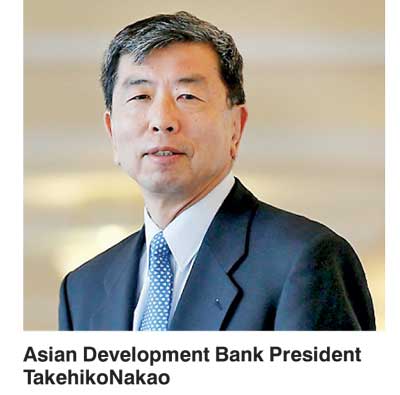Friday Feb 20, 2026
Friday Feb 20, 2026
Thursday, 10 December 2015 00:00 - - {{hitsCtrl.values.hits}}
 Reuters: TOKYO: Asian Development Bank President TakehikoNakao has said he did not expect US interest rate rises to trigger a financial crisis in Asia, but the bank remains ready to lend support to vulnerable countries.
Reuters: TOKYO: Asian Development Bank President TakehikoNakao has said he did not expect US interest rate rises to trigger a financial crisis in Asia, but the bank remains ready to lend support to vulnerable countries.
The US Federal Reserve is widely expected to raise interest rates for the first time in almost a decade at its next meeting 15-16 December, raising some concern about capital flows out of Asia and emerging economies.
But Nakao, a former Japanese Vice Finance Minister for International Affairs, said Asia’s financial systems had strengthened since the crisis of the late 1990s.
“US rate hikes won’t cause the kind of turmoil seen during the Asian financial crisis,” Nakao told Reuters in an interview. “But not all the countries are invulnerable to challenges, so the ADB will stand ready to provide funding support as needed.”
Some countries such as Indonesia and those is central Asia have already been hit by China’s economic slowdown and falling commodity prices, he added.
China’s economy is heading for its weakest expansion in a quarter of a century despite a series of stimulus measures, including cutting interest rates six times since November 2014.
“There’s room for monetary and fiscal policies in China to sustain growth near-term,” Nakao said.
But whether China can sustain growth longer-term will depend on reform efforts and technological innovation needed to offset expected decline in its labour force, Nakao added.
The International Monetary Fund on Monday admitted the yuan, also known as the renminbi, to the Special Drawing Rights (SDR) basket alongside the dollar, euro, pound sterling and yen.
Nakao said the yuan’s inclusion to the IMF’s benchmark currency basket is a “symbolic” move for China to join the international monetary system.
“It will encourage China to proceed with market-oriented reform, but whether internationalisation of the yuan will make headway will depend on its economy, financial sector and economic policy development,” he said.
Risks to the outlook in 2016 include China’s ability to achieve manageable growth through reform, falling commodity prices and their impact on resource exporters, he added.
Turning to infrastructure development in Asia, Nakao said the ADB would cooperate with Beijing-backed Asian Infrastructure Investment Bank (AIIB), which is seen as a rival to Japan-led ADB and US-led World Bank.
“We have agreed with the AIIB that Asia needs infrastructure investment, and we are seeking to identify first co-finance project in the first half of next year, while paying heed to environment and social safeguards.”